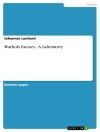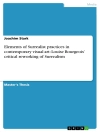In ‘Principle in Art, Etc, ‘ Coventry Patmore articulates his profound exploration of aesthetic theory and the nature of artistic creation. The text delves into the relationship between art and morality, arguing that true beauty derives from a rigorous adherence to personal and universal principles that bind both artist and audience. Patmore employs a rich, lyrical prose style, characteristic of Victorian literature, blending personal reflection with philosophical inquiry, creating a compelling narrative that challenges conventional perceptions of beauty and artistic integrity in the context of the 19th-century art movement. Coventry Patmore, a prominent poet and critic of the Victorian era, is known for his passionate advocacy of the Pre-Raphaelite movement and his belief in the transformative power of art. His life experiences, including his own struggles with religious faith and personal loss, significantly influenced his writings. These elements are woven into ‘Principle in Art, Etc, ‘ revealing Patmore’s pursuit of a deeper understanding of art as a moral endeavor and a means of divine communication. This book is highly recommended for anyone interested in the intersection of art, morality, and philosophy. Patmore’s richly nuanced arguments will resonate with artists, critics, and scholars alike, offering a timeless perspective on the responsibilities inherent in the creative process.
เกี่ยวกับผู้แต่ง
Coventry Patmore (1823-1896) was a distinguished English poet and critic, renowned for his contribution to Victorian literature. Born in Woodford, Essex, Patmore’s early literary influence stemmed from his father, Peter George Patmore, himself an author and critic. His early works, such as ‘Tamerton Church Tower’ and other poems, exhibited a distinct Pre-Raphaelite influence. However, Patmore’s most enduring legacy is ‘The Angel in the House’ which exquisitely depicts idealized domestic happiness and the virtues of a devoted wife, reflecting the Victorian social ethos. His later poetry, including ‘The Unknown Eros’, showcases a deeper, more mystical approach, and these works earned him a distinguished place among the psychological poets. Aside from poetry, Patmore’s steadfast interest in aesthetics and criticism is evident in his prose work, ‘Principle in Art, Etc, ‘ which sheds light on his literary theories and beliefs about art’s moral and spiritual dimensions. His literary style blends intellectual rigor with emotive expression, often infused with a strong religious sentiment. Although his popularity waned in the 20th century, recent scholarship has reinvigorated interest in Patmore’s work, recognizing its nuanced exploration of the intersection between spiritual life and the aesthetics of everyday existence.












